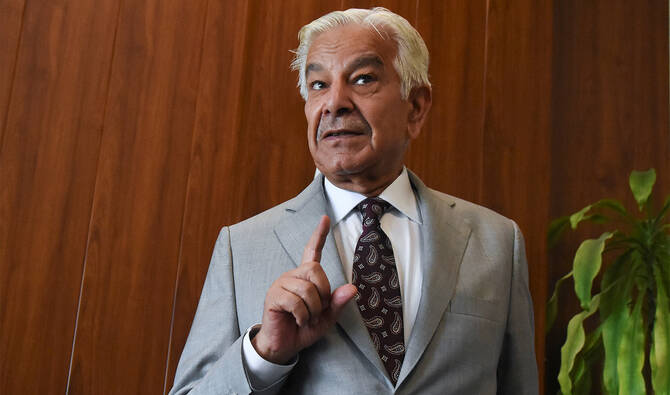ISLAMABAD: Pakistan’s Defense Minister Khawaja Asif said on Monday the next few days were “crucial” with regards to a possible Indian military incursion, as tensions surged between the two countries over an attack in Indian-administered Kashmir last week.
The attack killed 26 people and triggered outrage in India along with calls for action against Pakistan, whom it says is involved, accusations Islamabad has denied. India has long accused Pakistan of backing militancy in Kashmir, a region both nations claim and have fought two wars over. Islamabad says it only provides diplomatic and moral support to Kashmiris in their struggle for self-determination.
Tensions between the two nuclear-armed nations continued to boil on Monday, and experts and officials in Islamabad both raised the specter of limited airstrikes or special forces raids near the border with Pakistan.
Following a report by Reuters quoting Defense Minister Khawaja Asif as saying an Indian military excursion was “imminent,” he told a local news channel that he had said only that the next few days were “crucial.”
“The threat [of Indian attacks] is there, there is absolutely no doubt about it, but I have not suggested anything about its inevitability,” Asif told Geo News on Monday night.
“If something has to happen, then it will occur in the next two to four days … otherwise the immediate danger will pass.”
He added that if “war” was imposed on Pakistan, it was prepared for a “full response”:
“Our armed forces have 100 percent preparation, be it in our waters, air or soil. No one should have a doubt about this.”
Asif’s remarks followed a key meeting presided over by Pakistan’s deputy prime minister and foreign minister Ishaq Dar to discuss India’s suspension of the Indus Waters Treaty, which was one of the punitive measures it announced to downgrade ties with Islamabad following Tuesday’s attack. The treaty splits the Indus River Basin and its tributaries between Pakistan and India and ensures water for 80 percent of Pakistani farms.
“Pakistan will take all appropriate steps to safeguard its due share of water, guaranteed by the Indus Waters Treaty,” the Pakistani foreign ministry said in a statement after the meeting, quoting Dar.
“Pakistan will continue to advocate for the full implementation of the Treaty to ensure the protection of its water rights and the well-being of its people.”
The statement said India’s “unilateral and illegal” move to hold the treaty in abeyance contravened established norms of inter-state relations, international law, and the treaty’s own provisions.
“Noting that the waters of the Indus River System remain a lifeline for Pakistan’s 240 million people, he [Dar] deplored the Indian attempts to weaponize water,” the ministry added.
Earlier on Monday, Asif told Reuters Islamabad had approached friendly countries, including Gulf states and China, and also briefed Britain, the United States and others on the situation.
“Some of our friends in the Arabian Gulf have talked to both sides,” Asif said, without naming the countries.
China said on Monday it hoped for restraint and welcomed all measures to cool down the situation. Asif said the United States was thus far “staying away” from intervening in the matter.
Riyadh and Tehran have also both offered to mediate the crisis.
Pakistan and India have fought multiple wars, including two over the disputed region of Kashmir, since their independence from British rule in 1947.
In the past, New Delhi has accused Islamabad of backing militants who carried out the 2008 Mumbai attacks, which killed more than 166 people, including foreigners. Pakistan denies the accusations.
Diplomatic relations between Pakistan and India were weak even before the latest conflict as Pakistan had expelled India’s envoy and not posted its own ambassador in New Delhi after India revoked the semi-autonomous status of Kashmir in 2019.
















